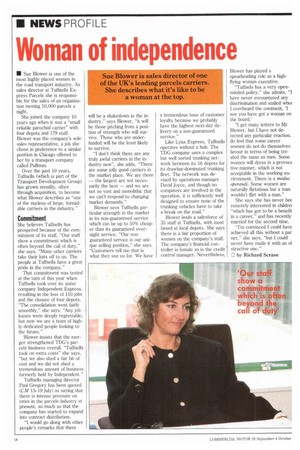Woman of independence
Page 20

If you've noticed an error in this article please click here to report it so we can fix it.
• Sue Blower is one of the most highly placed women in the road transport industry. As sales director at Tuffnells Express Parcels she is responsible for the sales of an organisation moving 10,000 parcels a night.
She joined the company 10 years ago when it was a "small reliable parochial carrier" with four depots and 179 staff. Blower was the company's sole sales representative, a job she chose in preference to a similar position in Chicago offered to her by a transport company called Pullman.
Over the past 10 years, Tuffnells (which is part of the Transport Development Group) has grown steadily, often through acquisition, to become what Blower describes as "one of the nucleus of large, formidable carriers in the industry."
She believes Tuffnells has prospered because of the commitment of its staff. "Our staff show a commitment which is often beyond the call of duty," she says. "Many other carriers take their hats off to us. The people at Tuffnells have a great pride in the company."
That commitment was tested at the turn of this year when Tuffnells took over its sister company Independent Express, resulting in the loss of 110 jobs and the closure of four depots. "The consolidation went fairly smoothly," she says. "Any job losses were deeply regrettable, but now we are a team of highly dedicated people looking to the future."
Blower insists that the merger strengthened TDG's parcels business overall. "Tuffnells took on extra costs" she says, "but we also shed a fair bit of cost and we did not shed a tremendous amount of business formerly held by Independent."
Tuffnells managing director Paul Gregory has been quoted (CM 13-19 July) as saying that there is intense pressure on rates in the parcels industry at present, so much so that the company has started to expand into contract distribution.
"I would go along with other people's remarks that there will be a shakedown in the industry," says Blower, "it will be those pitching from a position of strength who will survive. Those who are underfunded will be the least likely to survive.
"I don't think there are any truly awful carriers in the industry now", she adds. "There are some jolly good carriers in the market place. We are there — the largest are not necessarily the best — and we are not so vast and monolithic that we can't respond to changing market demands."
Blower sees Tuffnells particular strength in the market in its non-guaranteed service which can be up to 50% cheaper than its guaranteed overnight service. "Our nonguaranteed service is our unique selling position," she says. "Customers tell me that is what they use us for. We have a tremendous base of customer loyalty because we probably have the highest next-day delivery on a non-guaranteed service."
Like Lynx Express, Tuffnells operates without a hub. The TDG company uses a complex but well sorted trunking network between its 16 depots for its drawbar-dominated trunking fleet. The network was devised by operations manager David Joyce, and though no computers are involved in the operation, it is sufficiently well designed to ensure none of the trunking vehicles have to take a break on the road."
Blower leads a salesforce of 35 staff at Tuffnells, with most based at local depots. She says there is a fair proportion of women on the company's staff. The company's financial controller is female as is the credit control manager. Nevertheless, Blower has played a spearheading role as a highflying woman executive.
"Tuffnels has a very openminded policy," she admits. "I have never encountered any discrimination and smiled whei I overheard the comment, 'I see you have got a woman on the board.'
"I get many letters to Mr Blower, but I have not detected any particular reaction. do feel that some career women do not do themselves favour in terms of being treated the same as men. Some women will dress in a provoca tive manner, which is not acceptable in the working environment. There is a mod us operandi. Some women are naturally flirtatious but a man wouldn't flirt with a man."
She says she has never bee remotely interested in childrei "which has got to be a benefit in a career," and has recently married for the second time.
"I'm convinced I could have achieved all this without a par ner," she says, "but I could never have made it with an ot structive one."














































































































